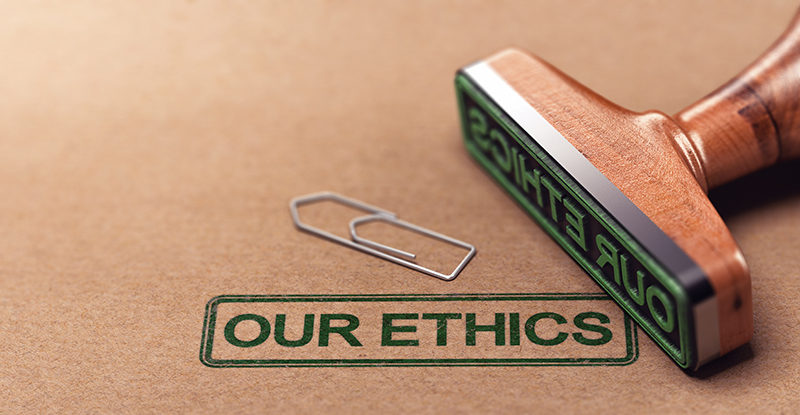
The March/April 2017 issue of CPABC in Focus featured an article on a professional’s responsibility to report various events to CPABC.1 Given both the ongoing importance of this topic and the continued growth of our membership, CPABC’s Professional Conduct department decided it was time for an update.
During our professional lives, most of us will become aware of at least one ethical dilemma or external event that may need to be reported to CPABC. This article outlines the reporting requirements for CPAs and candidates in the CPA Professional Education Program (collectively referred to as “registrants” in this article) and describes the actions that should be taken.2
The requirements to self-report your own conduct, report the conduct of other professionals, and report other events to CPABC stem from two principle sources: the CPABC Code of Professional Conduct (the CPA Code) and the CPABC Bylaws.
As stated in the preamble to the CPA Code: “Registrants have a fundamental responsibility to act in the public interest. The public’s trust and reliance on sound and fair financial and management reporting and competent advice on business affairs—and the economic importance of that reporting and advice—impose these special obligations on the profession.”3
The preamble further stipulates that “Chartered Professional Accountants conduct themselves at all times in a manner which will maintain the good reputation of the profession and serve the public interest…. In doing so, registrants are expected to avoid any action that would discredit the profession.”4
The conduct reporting requirements are found primarily in the following three rules of the CPA Code: Rule 101 (Compliance with governing legislation, bylaws, regulations and the Code); Rule 102 (Matters to be reported to CPABC); and Rule 211 (Duty to report breach of the CPA Code).
Additional instruction is provided in the CPABC Bylaws: Bylaw 408 (Obligation to Report) describes the matters that CPA candidates5 must report to CPABC, and Bylaw 511 (Obligation to Report) outlines the matters that must be reported by members.
This article summarizes these requirements for all CPABC registrants and provides important information for you to consider.
Self-reporting – what you need to know
Rule 101.2 of the CPA Code outlines the conduct that must be self-reported to CPABC. It states: “Registrants who identify that they have breached the CPA Code shall: a) take whatever action might be appropriate or required by law, as soon as possible, to satisfactorily address the consequences of any such breach; and b) evaluate whether the breach is such that it needs to be reported to CPABC, and if so, report it promptly.”6
As noted in the guidance to Rule 101, “[appropriate action] may include notifying those who may have been affected by the breach and when the breach is such that it diminishes the reputation of the profession or fails to serve the public interest, registrants are also required to notify CPABC of the breach” (our emphasis).7
Criminal matters
You must self-report all criminal convictions, including guilty pleas, to CPABC, regardless of the nature of the offence and regardless of the jurisdiction in which the offence occurred. You must report the matter to CPABC even if you receive an absolute or conditional discharge from the court. However, you do not need to report the laying of criminal charges against you.
Tax and securities offences
You must self-report if you are found guilty of a violation of any tax legislation that involves dishonesty on your part, or if you enter into a settlement with tax authorities in this regard.
Similarly, you must report convictions for any securities offences, regardless of whether you’ve been found guilty by a court or by an administrative tribunal of a securities commission. Additionally, you must report any settlement agreements reached with securities regulators.
As in the case of criminal matters, you do not need to report the laying of charges against you.
Matters with other regulatory bodies
Conduct that results in a breach of the requirements of another professional regulatory body is likely to diminish the good reputation of the CPA profession in British Columbia. Accordingly, you must notify CPABC if you fail to comply with the requirements of another professional regulatory body, including another Canadian CPA body, so CPABC can evaluate the breach against the requirements of the CPA Code.
You must also report any settlement agreements reached with other professional regulatory bodies and/or notify CPABC if you voluntarily de-register or resign from another body’s membership to resolve a disciplinary matter.
Convictions for other offences
Rule 213 (Unlawful activity) of the CPA Code stipulates that “A registrant shall not associate with any activity that the registrant knows, or should know, to be unlawful.”8 It’s important to note that this rule is not limited to Canadian criminal law, as convictions under statutes other than Canada’s Criminal Code may also diminish the reputation of the profession or fail to serve the public interest; these convictions must, therefore, be reported to CPABC. They include convictions under the statutes of any jurisdiction for:
- Misconduct in financial reporting or transactions. For example, breaches of Canada’s Proceeds of Crime (Money Laundering) and Terrorist Financing Act must be self-reported;
- Convictions under customs or immigration laws;
- Improper financial operations of a corporation;
- Misconduct in insolvency matters; and
- Other financial or ethical misconduct that reflects negatively on the CPA profession as a whole.
Not every legal breach diminishes the reputation of the profession or fails to serve the public interest. For example, the following events would not normally constitute events that need to be reported to CPABC:
- Administrative matters, such as late filing penalties from tax assessments and securities regulators;
- Tax reassessments;
- Administrative cease-trade orders from a securities regulator;
- The administrative actions of a customs and excise official;
- Routine traffic matters under a provincial statute, including roadside suspensions; and
- Municipal bylaw infractions.
Personal bankruptcy and financial matters
CPABC bylaws 408 and 511 require you to self-report when you undergo bankruptcy. This includes the filing or commencement of an insolvency proceeding, such as when a receiving order is granted against you. You must also report to CPABC if you file a proposal under the statutory provisions for insolvent debtors.
Civil disputes and other negative events
Other negative events may still need to be reported to CPABC, even if these events are not specifically listed in the CPA Code or the CPABC Bylaws. Here again, the applicable guidance is in Rule 101 of the CPA Code, which states that the determining factor is whether an event diminishes the reputation of the profession or fails to serve the public interest. While your mere involvement in a legal dispute is unlikely to meet this test, it is possible that the ultimate resolution of the dispute may diminish the reputation of the profession. In such cases, you need to self-report.
Reporting others: What are your obligations?
Rule 211 requires you to report any information concerning an apparent breach of the CPA Code or any information raising doubt as to the competence, reputation, or integrity of another CPABC registrant. While you are not required to carry out an investigation or reach a decision as to whether the CPA Code has been breached by another registrant, you must report the facts as known to you, along with any supporting documentation.
What if you’re not sure?
The guidance to Rule 211 makes it clear that the rule is not intended to require the reporting of minor, perceived faults, and states that it is not enough to simply suspect another registrant of professional misconduct. Each mistake is not necessarily a breach of the CPA Code—sometimes a mistake is an isolated incident that doesn’t require further inquiry. In deciding when to report, you should report only if you believe the matter raises doubts as to the competence, reputation, or integrity of the registrant(s) in question.
Exceptions to Reporting
While there are few exceptions to Rule 211, you do not have to report breaches of the CPA Code if:
- Reporting would result in the loss of solicitor-client privilege;
- The matter has already been reported to CPABC;*
- The matter is trivial;
- You are specifically exempted from reporting by the Board of Directors of CPABC (as is the case for CPABC’s practice reviewers and professional standards advisors, for example); or
- You have a statutory duty of confidentiality, such as the statutory requirement of confidentiality contained in the Income Tax Act, the Securities Act, or the Financial Institutions Act.
*Although you do not have a duty to report matters that you know have already come to CPABC’s attention, the guidance to Rule 211 makes it clear that you must report if you know that certain facts have been concealed, distorted, or otherwise not reported to CPABC.
Rule 211 also contains exceptions for those involved in litigation support engagements of a civil or criminal nature. If you are engaged in a civil or criminal investigation, you do not need to report the matter to CPABC until:
- Your client or your employer consents to the release of the information;
- You become aware of the fact that third parties (other than legal advisors) are aware of the information; or
- It becomes apparent to you that the information will not become known to third parties, other than legal advisors.
When you cannot keep matters confidential
The exceptions regarding statutory confidentiality do not include civil non-disclosure agreements. For example, subject to the discussion that follows, even if you’ve entered into an employment agreement or commercial/professional agreement that requires confidentiality, you must still report to CPABC any suspected breaches of the CPA Code, regardless of the terms of the agreement.
We recognize that the CPA Code requirements may put you in an ethical bind, as—in the absence of an exemption—employers or clients may assume that you will not disclose information without their consent and that you will, therefore, resist your obligation to report. As a result, reporting to CPABC without an employer’s knowledge or consent could result in a claim against you; we recommend, therefore, that you carefully examine the terms of any employment agreement before signing on the dotted line.
In client situations, you should inform the client that while you will seek their consent to report the information, your obligation to the public and the profession must prevail even if their consent is not forthcoming, as you are obliged to report under the CPA Code. We also recommend that you consider seeking legal advice in such situations.
Do you know someone who hasn’t self-reported?
Under Rule 211, if you know a registrant who has not self-reported to CPABC when required to do so, you must report the matter. Failure to do so may put you in breach of the CPA Code.
How to report to CPABC
If you need to self-report or report an event or breach of the CPA Code or CPABC Bylaws to CPABC, you should email your disclosure to professionalconduct@bccpa.ca. We will confirm receipt of your report and contact you for further details.
Do you need guidance?
The guidance in the CPA Code is designed to help you understand how the rules should be applied. CPABC’s professional standards advisors are also here to help. You can consult them for confidential guidance to ensure that you stay compliant with the CPA Code and the CPABC Bylaws when navigating difficult situations. Contact our advisors by email at professionaladvisory@bccpa.ca.
This article was originally published in the November/December 2022 issue of CPABC in Focus.
Footnotes
1 “Your Duty to Report Conduct to CPABC – Including Your Own,” CPABC in Focus, March/April 2017 (32-35).
2 In this article, “registrant” does not refer to students taking CPA preparatory courses.
3 CPABC Code of Professional Conduct (5).
4 Ibid.
5 Candidates are referred to as “students” in both the CPA Code and the CPABC Bylaws.
6 CPA Code (13).
7 Ibid.
8 CPA Code (146).



